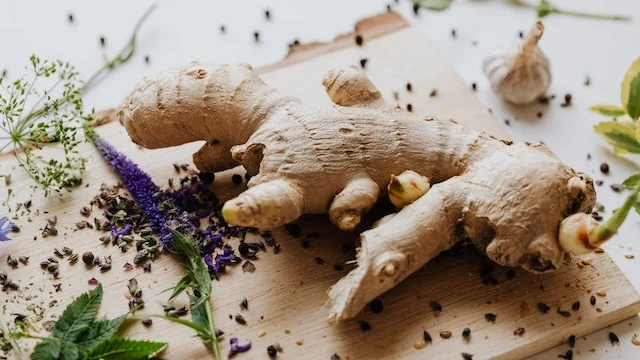Have you ever wondered about the health benefits of ginger and its antioxidant properties? Well, wonder no more! Ginger is a powerhouse when it comes to its numerous health benefits. It boasts antioxidant and anti-inflammatory properties, which can contribute to better cardiovascular health, pain relief, and improved digestion.
But that’s not all – ginger is also well-known for its ability to reduce nausea and vomiting, making it a popular choice for alleviating morning sickness. And the best part? Ginger is generally safe to eat, as long as you don’t go overboard. In fact, it is recommended to consume real ginger rather than supplements for maximum benefits.
Whether you’re adding it to soups, stir-fries, or even desserts, ginger can easily find its way into your meals and offer a range of health perks. If you’re looking for inspiration, there are plenty of ginger recipes out there – from ginger tempeh to ginger milk pudding, the possibilities are endless!
So why not give this incredible root a try and unlock its full potential for your well-being?
Ginger and its Health Benefits
Ginger is a versatile and flavorful spice that not only adds a special touch to your dishes but also offers numerous health benefits.
From antioxidant and anti-inflammatory properties to contributing to cardiovascular benefits, pain relief, improved digestion, and reducing nausea and vomiting, ginger has a lot to offer for your overall well-being.
Antioxidant and Anti-inflammatory Properties
Ginger is rich in antioxidants, which help protect your body against free radicals that can damage your cells and contribute to various diseases.
By neutralizing these harmful molecules, ginger helps reduce inflammation in your body, which is a key factor in many chronic conditions such as arthritis, heart disease, and certain types of cancer.
Contributions to Cardiovascular Benefits
Research suggests that ginger may have a positive impact on cardiovascular health. The antioxidant and anti-inflammatory properties of ginger can help lower blood pressure and reduce cholesterol levels.
These effects can contribute to a lowered risk of heart disease and other cardiovascular issues. Incorporating ginger into your diet may be a natural and delicious way to support your heart health.
Pain Relief
Ginger has been used for centuries as a natural remedy for pain relief. Whether you’re dealing with muscle soreness, menstrual cramps, or joint pain, ginger’s anti-inflammatory properties can provide relief.
Additionally, some studies have shown that ginger may be effective in reducing the severity of migraines. So, next time you’re experiencing any kind of pain, consider reaching for some ginger as a natural alternative to over-the-counter pain medications.
Improved Digestion
If you often struggle with digestive issues like bloating, indigestion, or constipation, ginger might just be your new best friend. Ginger stimulates the production of digestive enzymes and improves the absorption and assimilation of nutrients in your body.
It also helps relax the muscles of the digestive tract, easing any discomfort or cramping. Adding ginger to your meals can promote better digestion and enhance your overall gut health.
Reducing Nausea and Vomiting
Ginger is renowned for its ability to alleviate nausea and vomiting. Whether you’re dealing with motion sickness, morning sickness during pregnancy, or the side effects of chemotherapy, ginger can provide relief.
It works by suppressing the nausea-inducing signals in your brain and calming the digestive system. Sipping on ginger tea or chewing on ginger candies can be effective ways to combat nausea and vomiting.
Safety and Consumption
When it comes to consuming ginger, it is generally safe for most people. However, it’s important to be mindful of your intake to avoid any potential side effects.
Safe Consumption
Incorporating small to moderate amounts of ginger into your diet is considered safe for most individuals. Whether you choose to include it in your meals or drink ginger tea, a daily intake of about 1-3 grams of ginger is typically well-tolerated and should not cause any adverse effects. Remember, moderation is key when it comes to enjoying the benefits of ginger.
Excessive Intake and Side Effects
While ginger is generally safe, consuming excessive amounts can lead to side effects. Some individuals may experience symptoms such as heartburn, stomach upset, or diarrhea when consuming large quantities of ginger.
If you’re prone to these issues or have any pre-existing gastrointestinal conditions, it’s best to consult with a healthcare professional before significantly increasing your ginger intake.
Recommendation to Consume Real Ginger
While ginger supplements are available in various forms, it is recommended to consume real ginger whenever possible. Whole ginger root or ground ginger powder can provide you with the maximum health benefits and flavor.
Supplements may not always provide the same bioactive compounds found in fresh ginger, so opting for the real thing ensures that you’re getting all the goodness ginger has to offer.
Incorporating Ginger into Meals
Now that you know about the health benefits and safety of ginger, let’s explore some creative ways to incorporate this versatile spice into your meals.
Adding Ginger to Soups and Stews
One of the easiest ways to introduce ginger into your diet is by adding it to soups and stews. Whether you’re making a hearty vegetable soup or a comforting chicken stew, a knob of ginger can add a subtle warmth and depth of flavor.
Simply peel and grate the ginger, and sauté it with your other aromatics before adding it to your dish. You’ll be amazed at how this simple addition can elevate the taste of your favorite recipes.
Using Ginger in Stir-fries
Stir-fries are a great way to pack in a variety of flavors and textures, and ginger can be a fantastic addition to these dishes. Thinly slice or finely chop some ginger and toss it into the hot pan along with your choice of protein and vegetables.
The ginger will infuse the stir-fry with its unique zing, creating a delicious and aromatic meal that you won’t be able to resist.
Ginger in Baked Goods and Desserts
Don’t limit ginger’s potential to just savory dishes. This versatile spice can also add a delightful kick to your baked goods and desserts.
Whether you’re making gingerbread cookies, ginger scones, or ginger-spiced cakes, using ground ginger or freshly grated ginger can bring a warm and comforting flavor to your treats. The combination of sweet and spicy is sure to be a crowd-pleaser.
Ginger Recipes
If you’re looking for specific ginger recipes to try, here are a few delicious options to get you started:
Ginger Tempeh
Marinate tempeh in a mixture of soy sauce, lime juice, grated ginger, and garlic. Pan-fry until golden and crispy. Serve this ginger-infused tempeh over steamed rice or in a wrap for a flavorful and protein-packed meal.
Ginger Dressing
Whisk together grated ginger, rice vinegar, soy sauce, honey, and sesame oil to create a tangy and refreshing ginger dressing. Drizzle it over mixed greens, grilled vegetables, or use it as a marinade for meats or tofu.
Ginger Soba Noodles
Cook soba noodles according to package instructions. In a bowl, mix together soy sauce, sesame oil, grated ginger, garlic, and a splash of lime juice. Toss the cooked noodles with the ginger sauce, along with your choice of sautéed vegetables and protein. Top with sesame seeds for an extra flavorful crunch.
Ginger Milk Pudding
In a saucepan, heat milk, sugar, grated ginger, and a pinch of salt. In a separate bowl, whisk together cornstarch and a small amount of milk to create a slurry. Slowly pour the slurry into the saucepan while whisking continuously.
Cook until the mixture thickens and coats the back of a spoon. Pour the ginger-infused milk pudding into individual bowls or ramekins and refrigerate until set.
These are just a few examples of the many delicious ginger recipes out there. The possibilities are endless when it comes to incorporating ginger into your culinary creations.
In conclusion, ginger is not only a flavorful spice but also a powerhouse of health benefits. From its antioxidant and anti-inflammatory properties to its contributions to cardiovascular health, pain relief, improved digestion, and reduction of nausea and vomiting, ginger deserves a place in your diet.
Remember to consume it in moderation, and opt for real ginger whenever possible to reap its maximum benefits. So go ahead, spice up your meals and explore the wonderful world of ginger!

